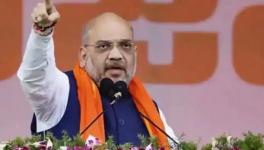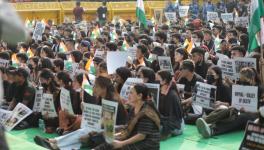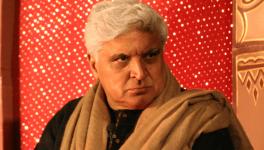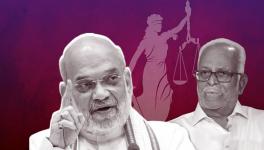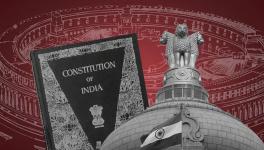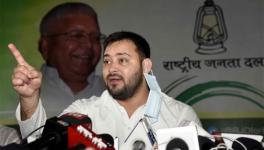West Bengal Election: CAA, NRC and Manifestos of Major Parties
File Photo.
The Bharatiya Janata Party, in its manifesto for the West Bengal Assembly election, has made three main promises under the welfare of refugees’ scheme. The BJP state unit has promised to implement the Citizenship Amendment Act (CAA), 2019 in the first cabinet meeting “to regularise the citizenship of Bangladeshi Hindu ‘refugees’.”
It has also promised a Mukhyomontri Sharanarthi Kolyan Scheme with a corpus of Rs.100 crore for the welfare of refugees who will get citizenship under the Citizenship Amendment Act. It has also promised to “transfer of Rs. 10,000 per year to each refugee family for 5 years after acquiring Indian citizenship”. Though, BJP has promised a “single window clearance to get documents such as Aadhaar card, Ration card and Voter ID Card”, most of the Bangladeshi “migrants” living in West Bengal have one or more such identify cards.
The BJP has never indicated the total number of “Matua refugees” will be benefitted through the implementation of CAA. However, according to the Joint Parliamentary Committee Report, a total of 31,313 individuals belonging to the minority communities, out of which “25,447 Hindus, 5,807 Sikhs, 55 Christians, 2 Buddhists and 2 Parsis” living in India with permanent visa based on their claim of religious persecution in their respective countries and want Indian Citizenship will be given Indian citizenship status.
According to norms, rules should be framed and notified by the corresponding ministry under a statute as soon as possible, and no later than six months from the date on which the statute comes into effect. It has been 16 months since the Indian Parliament passed and the President of India signed the Citizenship (Amendment) Act 2019. However, the Home Ministry has not framed the CAA rules yet. The ministry had requested the Committee on Subordinate Legislation on four occasions for extensions and now, the ministry has time till 9 July 2021 to frame the rules.
Although earlier the MHA had cited the Covid-19 pandemic as the reason, it is still unclear why the MHA sought the three other extensions of time. Interestingly, the government took just one month to frame and notify the rules for the three farm bills which were passed on 20 September 2020. This anomaly proves that the Centre wanted to implement the CAA only after the Assembly elections in West Bengal and Assam were over.
Another promise of the BJP is to give a monthly pension of ₹3,000 to Matua dalpatis i.e. Matua leaders. Needless to say, the promise was made just to ensure members of the Matua community vote in support of BJP candidates.
On 11 February 2021, Union Home Minister Amit Shah formulated a plan to grant Indian citizenship to refugees under the CAA, including to the Matua community who arrived in West Bengal from Bangladesh. This process will begin once the process of Covid-19 vaccinations is over. Now the Bengal unit of the BJP has promised in its election manifesto that the CAA will be implemented in the first Cabinet meeting if it comes to power. The likely date for the first cabinet meeting is 15 May, but no one believes the vaccinations will end by then!
These contradictions make the Matuas who do not have any documents to prove their citizenship more anxious. While their demand is for simple and unconditional citizenship, the CAA does not have a provision for this. According to the CAA, a “certificate of registration” will be offered to those who are to be granted citizenship. However, citizenship under the CAA will be granted only after an asylum-seeker has filed an application and meets some pre-defined conditions. While such provisions exist in the citizenship law, how can the government offer “unconditional citizenship” to just Matuas waiting to become Indian citizens?
With such contradictory tendencies and disconnects, in the name of offering citizenship, the government and the BJP’s Bengal unit are making Matuas and other people of the state feel even more confused.
In its election manifesto, the Left Front has promised that the Citizenship Amendment Act and NRC will not be introduced in the state. The Left Front has also pledged that appropriate importance will be given to the rehabilitation of “refugees” and “citizens” who came into West Bengal after 1971. If the Left Front is voted to power, it will seek support from the central government to resolve the refugee problem in the state.
All India Trinamool Congress—the party in power in the state—released its election manifesto on 17 March. West Bengal is one of the states to have passed a resolution against the CAA. Chief Minister Mamata Banerjee was extremely critical of the CAA and the National Register of Citizens (NRC). She had declared the CAA and NRC citizenship verification drive would be enforced in Bengal “over my dead body”. She led protests against the CAA, NRC and NPR.
The TMC manifesto says the state government has regularised 244 refugee colonies in the state. Residents of these colonies have been provided a freehold title deed that has benefitted around 45,000 families and pattas have been given to 3.5 lakh families. However, surprisingly, the AITMC has avoided mentioning the CAA, NRC, or NPR in its 66-page manifesto.
Like the AITMC, the Congress also has not used a single word on the CAA and NRC in West Bengal in its manifesto released on 22 March. The Congress party promised to restart the NRC process and repeal the CAA in its Assam poll manifesto.
According to the 2001 Census, more than 55 lakh people—7% of the population of West Bengal—were immigrants from other Indian states or abroad. On 31 December 2020, the total population of West Bengal was 9,96,09,303 and it is estimated to reach 100 million in 2021. This tells us that in 2021, there will be approximately 70 lakh people [7% of the new total population] with immigrant status in West Bengal, from other states, or abroad.
Most of this migrant/immigrant population and other vulnerable groups in West Bengal, including the Muslims, Matuas, Dalits, and Adivasis will get caught between the NRC, NPR, and CAA. This is why there is a genuine possibility that there can be an even bigger citizenship crisis in West Bengal than in Assam! Hence, the NRC has become a serious concern for voters of the state. The BJP Bengal, the TMC, and the Congress did not bother to mention anything about the NRC process in their manifestos.
It has also been reported recently that the Registrar General of India (RGI) is planning field trials of the first phase of the Census and the NPR, which was scheduled from 1 April 2020 but was indefinitely postponed because of the pandemic. Though many suggest that the NPR does not imply an NRC, the law allows both to be conducted simultaneously. Thus, the voters of West Bengal find a clear link between NPR, NRC, and CAA—which Home Minister Amit Shah, in his characteristic way, has confirmed are part of an interconnected “chronology” of implementation.
The CAA does not only introduce religious filters in citizenship claims but also exposes India’s poor, women, Adivasis, and other vulnerable groups to the risk of being stripped of citizenship. As the Home Minister has said that the NRC would follow soon, millions of Indians, including West Bengal residents, will soon be standing in queue to prove their nationality.
Earlier this month, the Joint Forum Against NRC, a group of organisations who oppose the CAA, NRC, and NPR, completed an eight-day journey to raise awareness on them and organised 25 meetings with Matuas and other citizens in West Bengal. While people of the state are demanding a repeal of the CAA and NRC, it is not clear enough why they not topmost on the agenda of the TMC and Congress. These are highly important election issues in West Bengal—not only for Matua voters, but for Muslim, Dalit, and Adivasi voters too.
The present government’s desperation to implement nationwide NPR, CAA and NRC would create further anxieties, divisions, and uncertainties in an already fissured society. Hence, all main Opposition political parties must come together in the interest of the people of West Bengal.
The author is a postdoctoral research associate with the Arts and Humanities Research Council-funded project called “Reimagining citizenship: The politics of citizenship amendment act in India” at the University of York. The views are personal.
Get the latest reports & analysis with people's perspective on Protests, movements & deep analytical videos, discussions of the current affairs in your Telegram app. Subscribe to NewsClick's Telegram channel & get Real-Time updates on stories, as they get published on our website.













